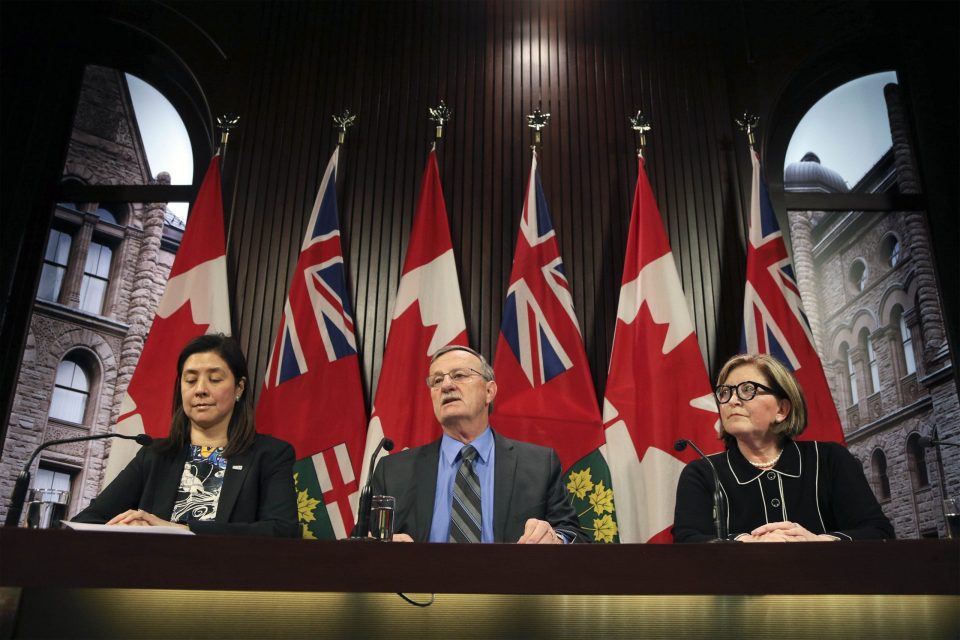Contradicting what Premier Doug Ford has told the public for months, Ontario’s auditor general said public health officials, including the province’s embattled chief medical officer of health (CMOH), aren’t the ones leading the response to COVID-19.
Auditor General Bonnie Lysyk, who delivered a more than 230-page report on the province’s pandemic response on Wednesday morning, found that Dr. David Williams failed to do key parts of his job as CMOH, like coordinate with local health units and issue directives for the public, instead ceding those responsibilities to Ford’s cabinet.
Williams became the focus of controversy at Queen’s Park on Tuesday, when a motion tabled by the Ford government to extend his contract into 2021 wasn’t unanimously approved by the house, forcing an evening debate on the matter.
On Monday, NDP deputy leader Sara Singh, said her party had “concerns” about the re-appointment of Williams and that a “non-partisan” discussion was needed about Williams’ performance.
“The Ford government cut back on public health protections just as the second wave was starting to surge, and set disastrously high thresholds for action,” Singh said. “People are legitimately concerned about whether Dr. Williams actually advised Doug Ford to do these dangerous things — or, rather, if Dr. Williams is just justifying political decisions.”
READ MORE: Opposition slams Ford for ‘minimizing’ threat of COVID’s second wave
Ford and his ministers praised Williams’ performance on Tuesday, with the premier saying he doesn’t believe in “changing a dance partner in the middle of a dance, especially when he’s an incredible dancer, like Dr. Williams.”
With their majority, the government is expected to approve Williams’ extension, but the debate was adjourned last night because it ran too late.
According to Lysyk, Williams “did not fully exercise” his powers under the province’s health legislation to respond to the pandemic.
“(Williams) did not issue directives to local medical officers of health to ensure public health units responded consistently to the COVID-19 pandemic, nor did he issue directives on their behalf,” the report read. “In May 2020, 34 local medical officers of health jointly prepared and signed a document stating there needed to be more direction and regional consistency.”
Lysyk’s report found that the province’s overall response to the pandemic was hindered by “systemic issues and delays,” causing it to act slower than other jurisdictions.
Several factors led to the delayed response, Lysyk said, including outdated provincial emergency plans, few staff and high leadership turnover at Ontario’s Emergency Management Office, and structural problems, like a lack of lab surge capacity for testing and outdated IT systems for data and case management.
Lysyk’s audit also found that the province’s Health Command Table — referenced frequently by the premier as the source of his COVID policy advice — began to take on an “increasingly complex structure” as the pandemic wore on, growing from 21 members to 83 by August.
READ MORE: Ford moves Toronto and Peel into lockdown as COVID cases surge
For months, the table communicated exclusively by teleconference, which Lysyk said created confusion. By mid-July, the meetings were transitioned to videoconference. However, according to the report, “no fulsome documentation” of the conversations exist.
Last week, Ford avoided questions from reporters about whether he would commit to making public the advice he gets from Williams and the command table. He did so after the Toronto Board of Health unanimously voted to ask the Ford government to reveal the advice.
The audit also knocked the province for failing to adopt the lessons of the 2003 SARS commission report, which focused on how Canada responded to the domestic outbreak almost two decades ago.
“The SARS Commission’s final report identified taking preventative measures to protect the public’s health even in the absence of complete information and scientific certainty as the most important lesson of SARS,” Lysyk said in a statement. “Following this principle means taking informed decisive action early. This is not what the audit found; instead, we found systemic issues and delays in decision-making.”
Lysyk said she plans to probe Ontario’s COVID response further and will deliver a special report on the province’s pandemic expenditures, personal protective equipment and long-term care issues. No timeline was provided for that report.
More to come
READ MORE: Trudeau returns to reclusiveness as feds signal Canada’s virus fight is faltering


